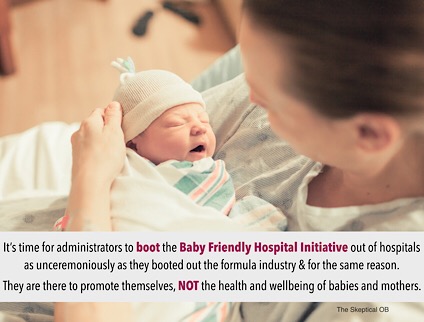
How can we explain the unmerited veneration of breastfeeding in contemporary society?
The predicted benefits of raising breastfeeding rates have failed to appear; tens of thousands of infants are harmed each year; and breastfeeding promotion hasn’t saved money, only wasted it. Nonetheless breastfeeding is still promoted aggressively.
[pullquote align=”right” cite=”” link=”” color=”” class=”” size=””]Like the formula industry before it, the breastfeeding industry has invaded hospitals to promote itself, not the health or wellbeing of babies and mothers.[/pullquote]
Why?
The celebration and promotion of breastfeeding is a case study in the pernicious rise of quasi-science.
Everyone is familiar with pseudoscience. It is sham science, from the Greek pseudo for “fake.” Breastfeeding promotion isn’t pseudoscience, but it isn’t real science, either. I propose the term quasi (also Greek) for “nearly” to identify something that appears to be science — and may even invoke some scientifically valid claims — but ultimately isn’t real science because it violates the most critical principle of science: it is non-falsifiable.
How did breastfeeding promotion become quasi-science?
It’s all about the breastfeeding industry and market share. While they claim to abhor the tactics of the formula industry, no one could have copied those despised tactics more assiduously than the lactation profession. They recognized early on that it’s all about marketing!
Breastfeeding as natural is adequate for marketing breastfeeding goods and services to lay people, but the holy grail for the breastfeeding industry was to supplant the formula industry in hospitals. What better way to promote breastfeeding could there be than to give it both the imprimatur of medicine and exclusive access to new mothers recovering in hospitals?
But doctors weren’t likely to believe that just because something is natural it must be good. So lactation professionals chose a marketing technique they knew physicians were likely to understand: they medicalized infant feeding. The language and authority of science was once used to promote formula feeding as best; lactation professionals now use the language and authority of science to promote breastfeeding as best.
The Baby Friendly Hospital Initiative, created by the World Health Organization in conjunction with La Leche League, instituted elaborate medical practices around breastfeeding and justified its intrusiveness with claims of major medical benefits.
Breastfeeding saves lives!
Every woman can breastfeed!
Formula supplementation interferes with breastfeeding!
Pacifiers cause “nipple confusion”!
Long periods of skin-to-skin contact facilitate breastfeeding!
Mandating mother/baby rooming in makes it easier to breastfeed!
This was the first indication that breastfeeding was quasi-science, not real science. The lactation profession literally fabricated “science” to support its goals.
It is shocking to reflect that those claims were confidently made in the ABSENCE of any scientific evidence to support them. It was fully a decade before anyone attempted scientific investigation of the specific claims and by then nearly every scientific investigation was undertaken for the purpose of supporting the existing claims, not testing them.
That speaks to the non-falsifiability of medical claims about breastfeeding. Of course lactation professionals and the scientists they enlisted in their cause did not understand at the time that they were violating a basic principle of science. To the contrary, they were so sure that breastfeeding is always so much better than formula feeding that they embarked on scientific investigation merely to prove what they already believed to be true.
And at first, they found the scientific evidence they “knew” they would find. Small observational studies suggested that breastfeeding did indeed have significant benefits. Those findings were publicized far and wide and became the basis for aggressive breastfeeding marketing and promotion efforts.
But those small observational studies did not correct for socio-economic status, a critical flaw when studying something that is as socio-economically patterned as breastfeeding. Women of higher educational socio-economic status are much more likely to breastfeed. Therefore, the purported benefits of breastfeeding might actually be benefits of wealth and access to healthcare.
The past decade has witnessed a thorough debunking of nearly every claim made about the benefits of breastfeeding. When studies are corrected for maternal socio-economic status, the benefits of breastfeeding evaporate. Unfortunately, the lactation profession has made the deliberate choice to ignore that the scientific evidence they repeatedly quote was debunked long ago. That’s another reason why breastfeeding promotion is quasi-science: it doesn’t change as the scientific evidence changes. It relies on real science, but real science that has been superseded by better science.
The lactation profession has chosen not merely to ignore the fact that their favorite scientific claims have been bebunked, but, more ominously, they have chose to ignore the large and growing body of scientific evidence that breastfeeding promotion is harmful to babies, actually injures and in some cases kills them. That, too, speaks to the non-falsifiability of claims about breastfeeding promotion.
The bottom line is that breastfeeding promotion is quasi-science (nearly science but not real science) because:
It’s central claims were enunciated before they were tested.
It promotes real scientific evidence, but evidence that has been debunked.
It doesn’t change when the scientific evidence changes.
It ignores scientifically documented harms.
And most importantly:
It’s central claim is non-falsifiable; the breastfeeding industry will never admit that breastfeeding is NOT best for every mother and every baby.
Although it is not science, it is nearly science, and that has fooled us, but no longer.
It’s time for doctors, nurses and hospital administrators to boot the Baby Friendly Hospital Initiative out of hospitals as unceremoniously as they booted out the formula industry and for the same reason. They are there to promote themselves, not the health and wellbeing of babies and mothers.

